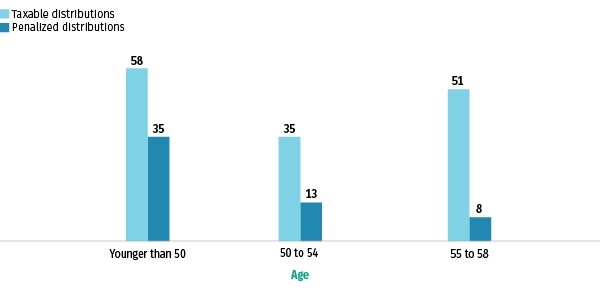New Analysis Shows Prior Estimate Vastly Overstates Retirement Plan “Leakage”
Washington, DC; June 8, 2020—Previous studies substantially overestimate leakage from retirement accounts, according to new analysis of tax data by Investment Company Institute (ICI) economists Peter Brady and Steven Bass. The term “leakage” refers to early withdrawals from retirement accounts used for nonretirement purposes.
The new analysis, “Decoding Retirement: A Detailed Look at Retirement Distributions Reported on Tax Returns,” finds that a reasonable estimate of leakage is the amount of distributions subject to penalty for early distributions under the tax code and that such penalized distributions account for only around half of taxable distributions received by taxpayers younger than age 55.
“For years, observers have used measures of taxable distributions received by younger taxpayers to create a narrative of massive leakage from retirement accounts,” said Peter Brady, ICI senior economic adviser. “With this new analysis, we were able to dig deeper into the data, and it’s clear that non-penalized distributions generally should not be considered leakage. This is an important distinction because non-penalized distributions include, for example, regular pension benefits paid to retired military, police, and firefighters, as well as distributions made after a worker dies or becomes disabled. Using the measure of penalized distributions, we see that leakage is occurring at about half the rate previously estimated.”
Distributions from a pension, annuity, or individual retirement account (IRA) to individuals younger than age 59½ are generally subject to a 10 percent penalty on early distributions under the federal income tax. There are numerous exceptions to the penalty, however, including pension benefits paid to retired military, public safety officers, or other government employees, and distributions made after a worker dies or becomes disabled.
Prior analysis characterized all taxable distributions received by individuals younger than age 55 as evidence that assets in defined contribution plans and IRAs are being diverted from use in retirement. This overstates the extent of such leakage, however, both because it includes distributions from defined benefit plans and annuities and because exceptions to the early distribution penalty largely apply when assets are being used for retirement.
The study provides these new insights by comparing taxpayers’ reports of retirement distributions on tax returns with information reported to the Internal Revenue Service (IRS) by the payers of those distributions, including pension plans and financial institutions. Based on this information, the analysis determines that penalized distributions are a better proxy for leakage. In 2010, the year for which the data were analyzed, taxpayers younger than age 55 received $93 billion in taxable distributions, of which only $48 billion (or 51 percent) was penalized.
Only Half of Taxable Distributions Received by Taxpayers Younger Than 55 Are Penalized
Retirement distributions by tax treatment, billions of dollars, 2010

Source: Authors’ analysis of IRS data
Other key findings include:
- Nearly 60 percent of taxpayers aged 59 to 69 and nearly 85 percent of taxpayers aged 70 or older received retirement distributions other than rollovers, either directly or through a spouse.
- Among taxpayers aged 59 or older with distributions, non-rollover retirement distributions averaged $20,000 per person.
- Overall, taxpayers aged 59 or older received 80 percent of the dollars distributed through non-rollovers.
Brady and Bass have also released a related technical paper associated with this study titled “Reconciling Form 1040 and Form 1099-R Data.”
This research was conducted as part of the Statistics of Income Joint Research Program. Views presented are those of the authors and do not necessarily represent the views of the IRS or the views of ICI or its members.
